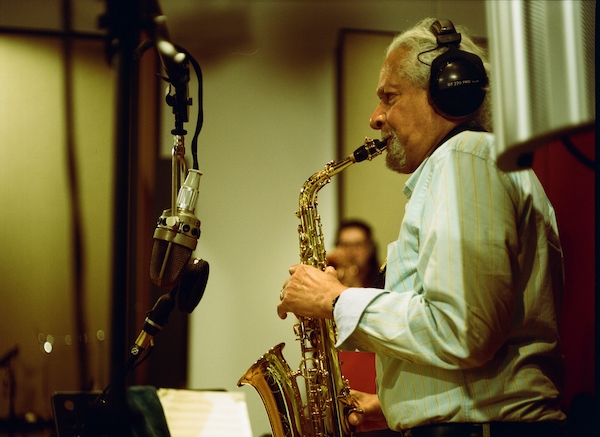Jan 13, 2026 2:09 PM
More Trump-Kennedy Center Cancellations
The fallout from the renaming of the John F. Kennedy Center for the Performing Arts to include President Donald…

Gary Bartz collaborated with the UK-based ensemble Maisha for Gary Bartz & Maisha—Night Dreamer Direct-To-Disc Sessions.
(Photo: Elaine Groenestein)A 6-year-old Gary Bartz heard Charlie Parker playing on a Baltimore radio station in 1946. He’d never heard anything like it.
During the next five years, a young Bartz envisioned how he’d sound if he ever got his hands on a horn. Because he couldn’t play then, he listened. And he’s been listening ever since.
“Nothing’s more important than listening,” the saxophonist said recently. “By the time I got my horn, I knew how I wanted to sound—through the listening.”
Every era-defining sound he helped develop—from Art Blakey’s Soul Finger to Miles Davis’ Live-Evil—emerged from deep, persistent concentration. Now, almost 75 years after that auspicious moment in Baltimore, Bartz continues listening.
In May, he’ll release Gary Bartz & Maisha—Night Dreamer Direct-To-Disc Sessions, a recording co-led with the ensemble Maisha, which includes guitarist Shirley Tetteh and trumpeter Axel Kaner-Lindstrom. Bartz first partnered with the seven-piece UK band for the inaugural We Out Here Festival in 2019. Beyond their chemistry, he was struck by their depth of listening—a practice he considers a vanishing art.
“A lot of young musicians don’t listen as deeply as they should,” Bartz said. On tour with Maisha, he felt a kinship with ensemble members that hearkened back to the days when, he contends, artists placed a higher premium on loyalty and every musical legend had a working band. “All of Miles’ bands—but any great band, music of any type—they listen. As long as everybody’s listening, then they’re together.”
Developing a sound identity, Maisha never rushed the process. Members took time to understand their individual habits and what Bartz calls each member’s “aural fingerprint.”
“When we play, we try and connect together and make sure we’re all feeling it all in the same way,” said Maisha drummer and bandleader Jake Long. “We’ve built up this relationship where we really understand each other’s playing.”
When Bartz began touring with the ensemble, their chemistry and mutual admiration electrified audiences, and the direct-to-disc model for the partnership’s first release seemed inevitable.
“Gary listens so well,” Long continued. “He’s so aware of the music happening around him. That’s what’s so amazing about his playing.”
With no edits or post-production, the recording renders a performance snapshot of their time in the studio. “Warts and everything—go,” said Bartz. “There’s no fixing anything. It’s like doing a live record date.”
Beyond performance, the artists’ collaboration sought expansive conversations off the bandstand, as well, including the question of context. For the studio date, they collectively composed three originals and arranged two of Bartz’s enduring tunes, “Dr. Follows Dance” and “Uhuru Sasa.” On the recording, Bartz opted to lay out on vocals for the latter, because he felt his singing might need a bit of post-production attention—not because he intended to alter the impact of the civil rights-era composition.

Belá Fleck during an interview with Fredrika Whitfield on CNN.
Jan 13, 2026 2:09 PM
The fallout from the renaming of the John F. Kennedy Center for the Performing Arts to include President Donald…

Peplowski first came to prominence in legacy swing bands, including the final iteration of the Benny Goodman Orchestra, before beginning a solo career in the late 1980s.
Feb 3, 2026 12:10 AM
Ken Peplowski, a clarinetist and tenor saxophonist who straddled the worlds of traditional and modern jazz, died Feb. 2…

The success of Oregon’s first album, 1971’s Music Of Another Present Era, allowed Towner to establish a solo career.
Jan 19, 2026 5:02 PM
Ralph Towner, a guitarist and composer who blended multiple genres, including jazz — and throughout them all remained…

Rico’s Anti-Microbial Instrument Swab
Jan 19, 2026 2:48 PM
With this year’s NAMM Show right around the corner, we can look forward to plenty of new and innovative instruments…

Richie Beirach was particularly renowned for his approach to chromatic harmony, which he used to improvise reharmonizations of originals and standards.
Jan 27, 2026 11:19 AM
Richie Beirach, a pianist and composer who channeled a knowledge of modern classical music into his jazz practice,…